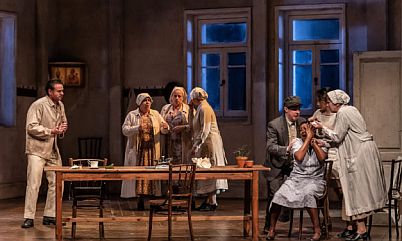
29 March
Tomáš Hanus, the conductor for last night’s performance of the WNO’s production of Jenůfa picked up a microphone before reaching for his baton. In a short emotional speech he dedicated the performance to the Ukrainian people, hoping they would be able to enjoy the opportunity of a better life, and citing Janáček’s music as ‘an island of beauty and humanity’.
Performed in three acts on designer Vicki Mortimer’s sets comprising rooms fashioned in simple rustic style, Janáček’s adaptation of playwright Gabriela Preissová’s 1890 original play entitled Her Stepdaughter, is an astonishingly vivid portrayal of the mores of village life in nineteenth century rural Monrovia. The opera Jenůfa closely follows Preissová’s story which is based on real-life events involving a trio of cousins, their stepmother and grandmother, as they struggle to preserve their outward appearance of honour in a deeply patriarchal society.
Half-brothers Števa and Laca are in competition for the hand of Jenůfa. Števa has the advantage of his good looks and being the blood-line inheritor of the mill owned by his grandmother. Laca is left to stew in his jealous rages, one of which will end in him cutting Jenůfa’s cheek with a knife out of frustration. What he doesn’t know yet is that Jenůfa is already pregnant out of wedlock by Števa. Stepmother Kostelnička Burjovka steps in as her charge is now in danger of both being ostracised by society and losing the chance to wed the father of her child, thereby despoiling the good name of the family.
What follows is a mother-daughter power play on acid. When your stepmum decides killing your baby is the best option surely only the worst of outcomes is inevitable. But in a blisteringly emotional finale Jenůfa rises above her pain to understand the motives and suffering of her stepmother, and the guilt-laden Laca proves to be a man who understands what love is, and offers the traumatised Jenůfa a glimpse of possible future happiness.
What is remarkable about Janáček’s score is that you can hear echoes in the orchestration of the speech patterns (in Czech) heard on stage. The strings, for instance, work in canon to sung dialogue blending singers and instruments as an organic whole – a direct result of the composer’s translations of overheard cadences apparently jotted down on his shirt cuffs. There is delightful invention within the writing – staccato xylophone notes build tension; double bass lines take up surprising leads while the poignant solo violin by orchestral Leader David Adams perfectly mirrored the pathos of the libretto. Woodwind, in particular flute and oboe, provided further conversational qualities. Pastiches of Moravian folk tunes could be heard in the chorus scenes, with clapping and tambourine adding to the pulse of the songs. The WNO orchestra delivered a scintillating performance, always egged on by the animated facial expressions of the conductor.
Elizabeth Llewellyn electrified the audience with her depiction of the ill-fated Jenůfa. With considered body language and her faultless and powerful soprano voice, she managed to capture her character’s heartache, sensitivity and desolation before finally illuminating the proceedings with a magnanimous sense of understanding and forgiveness.
In an opera that dwells on the intricacies of women’s relationships to each other, the evening pivots principally on Jenůfa’s connection with her stepmother, performed by the stately soprano Eliška Weissova. Weissova’s Kostelnička was a tour-de-force, taking us all down into her guilty despair with thrilling high notes as she revealed: “A long life would be a horror”. Peter Berger brilliantly transformed the tormented Laca from being a man of blinkered desire and limited emotional depth to someone who discovers redemption in self-sacrifice and a sense of what love really means, while Rhodri Prys Jones’s effectively kept Števa on his selfish, womanising trajectory. Both tenors delivered flawlessly. What a pity the Hippodrome was barely half full.
★★★★★ Simon Bishop 30th March
Photo credit: Clive Barda


